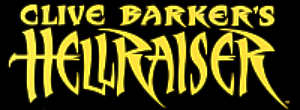
 Hellraiser Intro Hellraiser Book 1 Hellraiser Book 2 Hellraiser Book 3 Hellraiser Book 4 Hellraiser Book 5 Hellraiser Book 6 Hellraiser Book 7 Hellraiser Book 8 Hellraiser Book 9 Hellraiser Book 10 Hellraiser Book 11 Hellraiser Book 12 Hellraiser Book 13 Hellraiser Book 14 Hellraiser Book 15 Hellraiser Book 16 Hellraiser Book 17 Hellraiser Book 18 Hellraiser Book 19 Hellraiser Book 20 Hellraiser Spring Slaughter Hellraiser Summer Special Hellraiser Dark Holiday Special Hellraiser Hellraiser III Hellraiser: Collected Best |
The extraordinary event is this: that the moment you make a story or create an image that finds favour with an
audience, you've effectively lost it. It toddles off, the little bastard; it becomes the property of the fans.
It's they who create around it their own mythologies; who make sequels and prequels in their imagination; who point
out the inconsistencies in your plotting. I can envisage no greater compliment. What more could a writer or filmmaker
ever ask, than that their fiction be embraced and become part of the dream-lives of people who it's likely he'll
never even meet? Hellraiser, and to a lesser extent the novella upon which it's based, The Hellbound Heart were pieces of work that elicited these welcome responses from their first appearance on page and screen. That the Lament Configuration and the Cenobites its solving summons --Pinhead especially, of course--be taken to the hearts and imaginations of so many healthy perverse folks around the world was both surprising and reassuring to me. The former because film had been made very cheaply--as much to prove to myself and the overlords of Hollywood that I could turn a modest amount of money into a marketable film; the latter because the images and ideas in them pictured were extremely dark, and I was delighted that there was a sizable audience for a horror film that didn't dice adolescents in the shower, or have its tongue buried so deeply in its cheek it could lick out it's ear from the inside. But back to what I was saying about the work being possessed by high others. After the Hellraiser came Hellbound: Hellraiser II, in which writer Peter Atkins and director Tony Randall took the open threads of the first movie and wove therir own sequel. It wasn't the movie I would have made, but if was immensely to see how other minds and other talents dealt with the ideas; exploring avenues of I hadn't even contemplated when high first set pen to the paper. Which brings me on to the comic book in your hands, the first of what I hope will be many such little monsters. It's twin godfathers are Archie Goodwin and Dan Chichester, and its many parents are listed in the pages that follow. Though my name's on the cover I am, you see, just a bystandard at this baptism. But I'm proud nevertheless. Not just that so many fine creators were sufficiently attracted by the conceits of Hellraiser to expand its fictional world with tales of their own, but because -- lo and behold! -- the little bastard movie I made's got a life of its own. Who'd have thought it? Who'd have ever thought? -- Clive Barker |